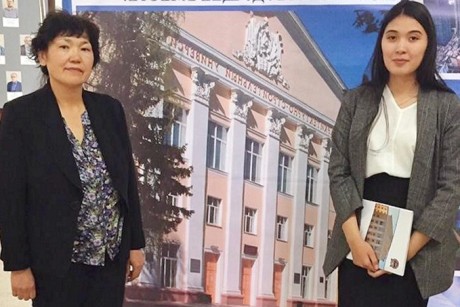Professor of the Department of Russian Philology of S.Toraighyrov PSU Tina Manyapova and student of group AI-201 Ayaulym Mukatayeva took part in ІІІ International Scientific Student Forum for foreign bachelors, graduate students, postgraduates “Student of the XXI century: dialogue, understanding, tolerance”, which was held at Novosibirsk State University of Architecture and Civil Engineering (Sibstrin) in preparation for the 90th anniversary of university.
Students from Russia, Vietnam, Zambia, India, Kazakhstan, Cambodia, China, Korea, Serbia, USA, Switzerland and other countries met at the event.
Young scientists presented research on scientific areas of the format of interdisciplinary synthesis (sociolinguistics, linguistic culturology and ethno-linguistics), problems of the economy of a number of countries, management and marketing strategies and communications, as well as issues of interethnic relations, etc.
In her welcoming speech, T. Manyapova noted that in our time it is very important to learn tolerance, to learn to find points of contact in different types of scientific and creative activity.
“Knowledge, understanding of the value of our culture and respect for the culture of other nations, openness, communication and free expression of thoughts, equality and freedom of choice of language for communication and performance are key factors for the success of the festival, the focus of which is multilingual education in a tolerant multicultural environment”, - T. Manyapova said.
These ideas are reflected in the report of Ayaulym Mukatayeva, who considered the issue of the development of tolerance in a multilingual education in the Republic of Kazakhstan.
The forum ended with the “Siberian Spring” festival, in which participants in different languages demonstrated creative works, as well as dance art and folk traditions.
It is worth noting that areas of collaboration were determined at a meeting with teachers of language disciplines. These are: holding international seminars on innovative educational technologies, further education courses in subject areas, joint development of disciplines and courses within educational programs, on-line lectures and courses, practice, internships, as well as joint research, publishing, external reviewing and others.







